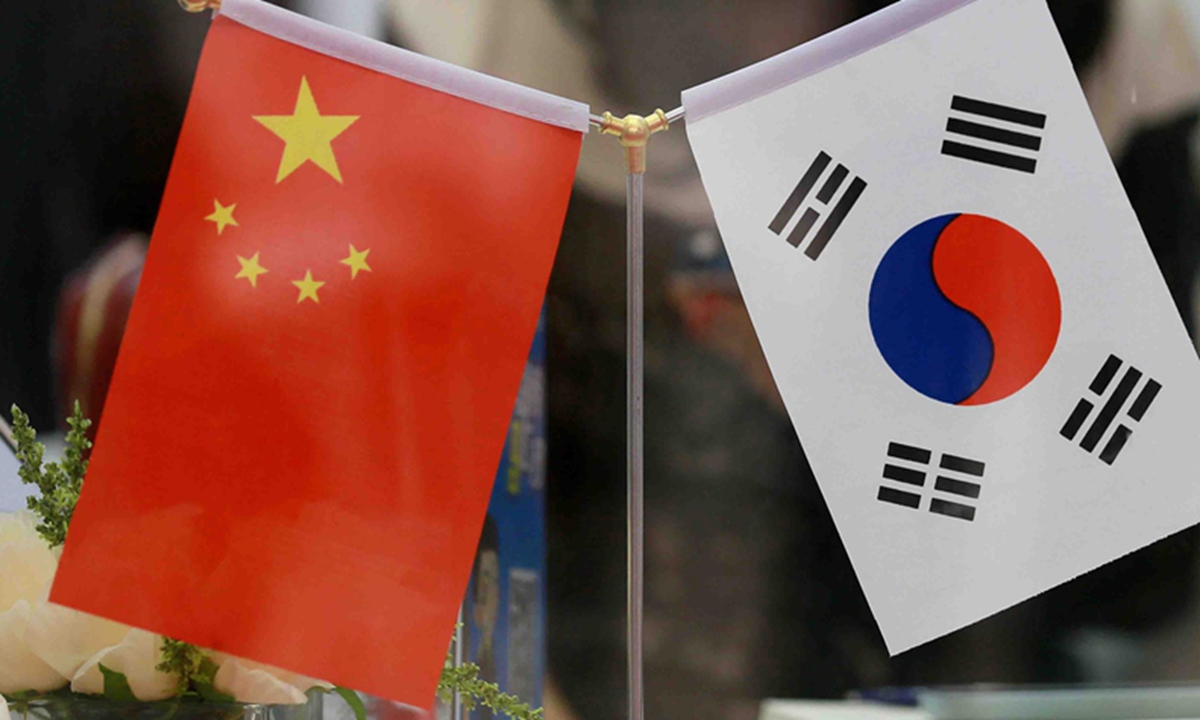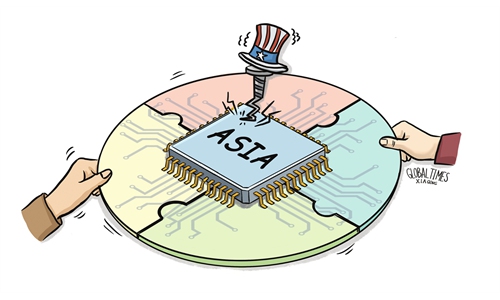South Korea strives to secure China ties amid US pressure on chips, missile system
Biden admin unlikely to force Seoul to sever ties with Chinese market: expert

China South Korea File photo:CGTN
With South Korean Foreign Minister Park Jin set to kick off a three-day visit to Qingdao in East China's Shandong Province on Monday, the first high-level official to travel to China since South Korean President Yoon Suk-yeol took office in May, on the same day, South Korean media cited an unnamed presidential official as saying that the country has decided to attend a preliminary meeting for "Chip 4" - an alliance created by the US that some believe aims to set up a semiconductor barrier against the Chinese mainland.
The simultaneous message also illustrated South Korea's political dilemma in striking a balance between China and the US in the face of increasing pressure from Washington, analysts said, warning that South Korea may face more losses if it totally sides with the US to counter China.
Chinese State Councilor and Foreign Minister Wang Yi will meet with Park during his stay in China, according to information from the Chinese Foreign Ministry. China is willing to take Park's visit as an opportunity to strengthen communication, focus on cooperation and promote the healthy and stable trend of bilateral relations.
Before coming to China, Park told a press conference that his trip would be a chance to reduce misunderstandings and boost cooperation in areas including trade, health and the environment, Reuters reported.
Park's visit to China has drawn close attention in China and South Korea, as the two countries are about to celebrate the 30th anniversary of the establishment of diplomatic relations. At the same time, there are many new and old issues that need to be urgently discussed, and compared to its more frequent interactions with the US, Japan and Europe, the new South Korean government has had fewer exchanges with China, Wang Junsheng, a research fellow of East Asian studies at the Chinese Academy of Social Sciences in Beijing, told the Global Times.
Wang noted that Korean Peninsula issues, the chip pact among the US, Japan, South Korea and the island of Taiwan, and the deployment of the Terminal High Altitude Area Defense (THAAD) missile system will be covered in bilateral meetings between senior officials from the two sides.
Li Kaisheng, a research fellow at the Shanghai Academy of Social Sciences, pointed out that Park's visit was made against the backdrop of the China-US tensions after US House Speaker Nancy Pelosi's provocative visit to the island of Taiwan and the Biden administration actively pulling China's neighbors into a small circle to counter China.
Despite China's stern warnings, Pelosi made a highly provocative visit to the island of Taiwan last week. When she traveled to South Korea after the Taiwan visit, South Korean President Yoon had a phone conversation instead of meeting her in person. This arrangement was interpreted by some analysts as an attempt to avoid the diplomatic fallout of Pelosi's visit to the island of Taiwan.
However, Li told the Global Times that the Yoon government has taken a value-oriented diplomatic approach, and given the differences between China and South Korea in their political systems and ideologies, many challenges to bilateral relations remain.
Li noted that the deployment of THAAD and whether South Korea will cooperate with the US in deploying more missiles are all uncertainties hampering China-South Korea relations.
China had urged the Yoon government to keep the preceding Moon Jae-in government's "Three No's" policy on the THAAD issue and act prudently on major issues concerning its neighbors' security, after Park said at the National Assembly in July that the "Three No's" policy is not a commitment to China.
Analysts warned that the Yoon government should understand the seriousness of the THAAD issue, as it had sparked outrage among Chinese people and pushed bilateral relations to their lowest in decades, adding that South Korea should not sacrifice its interests to follow the US.
However, the US has always wanted South Korea to be the bridgehead to counter China and will put more pressure on the Yoon government, analysts said, adding that given the closeness in trade relations between China and South Korea, leaning to the US will not fit South Korea's interests.
Balancing its relations with China and the US amid a more complicated geopolitical situation has and will be one of the major challenges for Yoon, said Xiang Haoyu, a research fellow at the China Institute of International Studies, noting that the heated discussions in South Korea over whether to join the Chip 4 alliance with the US, Japan and the island of Taiwan is one example reflecting South Korea's plight.
Dilemma for South Korea
On the same day that Park is scheduled to start his visit to China, South Korean media reported that Seoul has agreed to hold a preliminary meeting to lay down the ground rules for joining the Chip 4 alliance with Washington next month. Yoon said on Monday that the government is looking into the issue in the light of national interests.
Facing pressure from the US, the South Korean government has shown a tendency to sit on the fence, as it doesn't want to offend the US by refusing to be part of the Chip 4 alliance, but at the same time does not want to provoke China's anger, which might hurt their economic interests in the vast mainland market, analysts said.
Xiang Ligang, an independent tech analyst, told the Global Times that there is a high chance that South Korea will eventually become a member of the alliance, but the country is very likely to become a counterforce to the US within the alliance on many issues, in that it will object to many requirements raised by the US to crack down on China's chip market.
South Korea has massive interests related to the mainland market when it comes to the semiconductor industry. For example, it exports a vast amount of chips to China annually, including mobile phone chips and memory chips.
The Chinese mainland and Hong Kong accounted for 60 percent of South Korea's semiconductor exports last year, a report of the Korea Times noted.
Observers pointed out that South Korea may also raise more requirements on reducing the negative impact on its chip exports to China, for example on export and technology restrictions.
Xiang Ligang said that it's unlikely that the Biden administration will use very tough measures to force South Korea or other regions to sever themselves from the Chinese market, as it doesn't have enough political influence to control its allies at will.
Moreover, South Korea knows that cutting its chip business ties with China might prompt the latter to speed up its chip technological development. And once China manages to produce high-end chips at very low prices, those products will easily flood the South Korean market, as cars and home appliances have done in the past, Ma Jihua, a veteran semiconductor observer, told the Global Times.
Besides, friction on the chip issue could also trigger backlash on other products such as daily consumption products, which would bring huge economic losses to South Korea, whose economic development in recent years has been hugely dependent on business interactions with the Chinese market.
South Korean public opinion also differs on topics related to the chip pact, with many people opposed to cutting the chip business or decoupling with China, as such moves do not meet South Korea's interests, Xiang Haoyu pointed out, noting that although the Yoon government is aligned with the US, the latest drop in Yoon's approval rating showed that conservative forces in South Korea cannot fully represent the public will.
The conservative party may lean toward the US but South Korea's overall national strategy and public opinion will not overwhelmingly follow. This is also why China can work with South Korea to expand cooperation and shared interests, said Xiang Haoyu, noting that South Korea should also know that due to its own long-term strategic interests, it has little room to play the geopolitical card of closely following the US in countering China.

